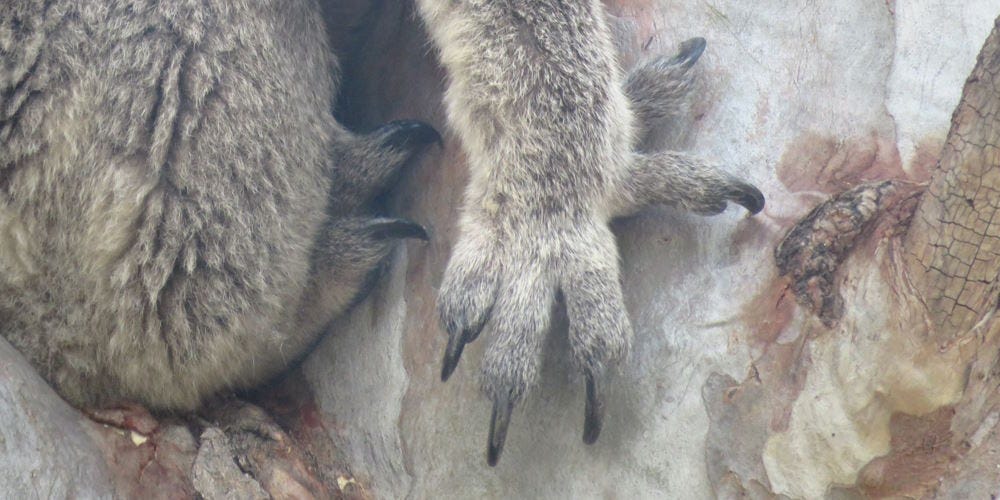I can’t believe that… koalas have fingerprints! Koalas are the only non-primates to have personalized fingerprints. Professor Maciej Henneberg conducted a study using ink and electron microscopy to print a koala’s fingerprints, whereupon he discovered that koala’s “skin is covered either by papillary ridges of the size, shape and arrangement very similar to humans.”1 The patterns on every koala’s fingers are unique. So, if you ever need to check a koala’s criminal records, never fear!
Side-fact that I learned today: koalas have two thumbs and three fingers on their front paws, which aid them in climbing trees.

Funny faces when eating something sour
So, my friend Aditya has a “quat” obsession. Anything from Nagami Kumquats (I prefer Meiwa) to “limequats,” a torturously sour variant of which he subjected his friends earlier this week. As we suffered, my friend Jess wondered aloud why humans have these involuntary facial reactions when eating sour foods.

I didn’t know, either, so I went a’ digging!
Turns out there’s no obvious answer, although it likely has to do with how the human body evolved to detect potentially harmful food (e.g., rotting fruit, or limequats). Spoiled foods tend to contain a lot of acid, as do certain fruits, like lemons or limes. Our tongues are equipped to detect these acids with sour-specific taste cells. Basically, these taste cells have proton channels that inform the brain, “hey, you’re eating something sus, dummy! Red alert!” You then undergo an innate reaction, where your jaw muscles contract, your lips pucker, and your salivary glands go into overdrive to dilute the acid.
While this research could give the impression that acids are all inherently bad for you, that isn’t true. Take ascorbic acid (a.k.a. Vitamin C), for instance! Without it, we’d all die of scurvy. Anyway, as someone with a nascent interest in the life sciences, I found this fascinating! I’ll continue to enjoy my Meiwa Kumquats, which only instigate mild lip-puckering, and leave Aditya to his limequats.
Where does “O.K.” come from?
Have you ever thought about how weird the word “O.K.” is? Is it an acronym for a word no longer in use or an abbreviation of “okay?” Did it enter English from another language?
Well, no.
I went down this rabbit hole earlier this week and what I found was pretty amusing. First off, American society had forgotten the origins of “O.K.” until a certain etymologist named Allen Walker Read (1906-2002) rediscovered it. A professor at Columbia University, Read spent much of his career retracing all the myths and rumored origins of “O.K.” until he found the truth.
Read discovered that the first instance of “OK” used in print dates back to the 1839, when some Boston dandies had started this year-long fad of creating acronyms—initially of common sayings like “give the devil his due,” or “G.t.d.h.d”—that morphed into intentionally misspelled words.2 In comes "all right,” which the Boston dandies misspelled as “oll korrect.” The initials to this weird spelling? “O.K.”
Look at that: people making Internet memes long before the Internet.
The 1840 U.S. presidential campaign subsequently popularized O.K., and although its proponent, then-president Martin Van Buren, failed to get himself re-elected, he prepared the American public for its rapid ascension in use following the invention of the telegraph. “O.K.” was easy to transmit via telegraph, and thus became universally accepted to indicate that you received information.
These days, O.K is everywhere and in nearly every language. 這是OK嗎?はい、オーケーです!окей? With its omnipresence, we have Professor Read to thank for clarifying its origins. I don’t know about you, but I think it’s pretty funny that this man is remembered as “the O.K. guy” in perpetuity.

Upcoming…
This weekend will be fairly busy for me, but I hope to have a new installment of Cities ready for you come early next week. I like the cadence of a Cities post early in the week and a Thoughts This Week every Friday. I’ll try to achieve Deep Dives 1-3 times a month, but I also don’t want to flood your inboxes! If you like this frequency or have any feedback about posts thus far, please feel free to reach out!
Maciej Henneberg et al., “Fingerprinting a Chimpanzee and a Koala: Animal Dermatoglyphics Can Resemble Human Ones,” Department of Anatomy and Histology, University of Adelaide (1998), https://www.academia.edu/27861086/1998_Fingerprinting_a_chimpanzee_and_a_koala.
Allen Walker Read, "The First Stage in the History of 'O. K.'," American Speech 38, no. 1 (1963): 5–27, https://www.jstor.org/stable/453580?origin=crossref.




